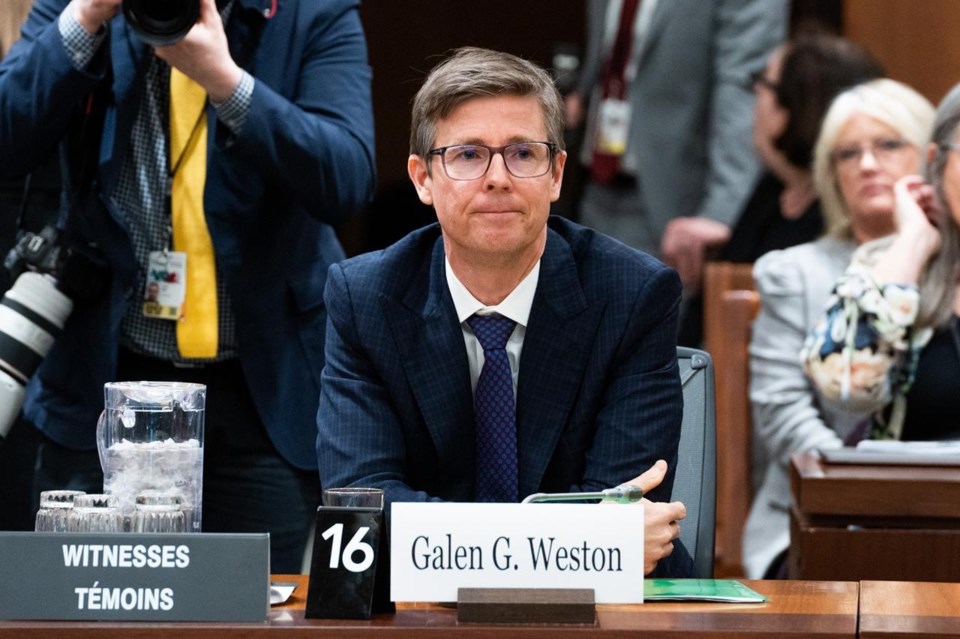Loblaw Cos. Ltd. chairman Galen Weston made an inaccurate statement about Australian grocery rules to a House of Commons committee, according to groups representing independent grocers, food suppliers and farmers.
The letter sent Tuesday to MP Kody Blois, who chairs the agriculture committee studying food prices, asked the committee to disregard this part of Weston's testimony when they draft their final report.
Speaking before the committee on Dec. 7, Weston told MPs that Canada's nearly complete grocery code of conduct would put too much power in the hands of large suppliers when it comes to price negotiations with retailers, which could raise prices for Canadians.
Using Australia's grocery code as an example, Weston said it has a third-party mechanism that has "supported increases in costs in essentially 100 per cent of cases," and that if this "had happened in Canada, since the beginning of last year, it would have resulted in $750 million in additional inflation pressure for consumers."
Weston's comments are "not correct," Chris Leptos, the independent reviewer for the Australian code, told The Canadian Press.
The Australian code does not have a mechanism for price negotiations, said Leptos in an email.
Weston was making a point about the potential costs of a “flawed dispute resolution process in Canada,” said Loblaw spokeswoman Catherine Thomas, adding that the focus seems to be on his comments regarding Australia “instead of the inadequacies of the draft Canadian code.”
“The code in Canada, as drafted, will make it harder for retailers to push back on cost increases from suppliers,” said Thomas, noting that multiple retailers have raised concerns about excessive price increase requests from large multinational suppliers.
“This is a smoke screen from people who don’t want to focus on the words of the Canadian code, which don’t work. As we’ve said all along, we are open to being back at the table to develop a code that will work best for our customers, and would encourage these associations to do the same.”
Citing "Australian sources," including Leptos, the letter to Blois urges caution when interpreting statements from witnesses about what a grocery code would or wouldn't do in Canada.
"While we have been very impressed by the level of knowledge showcased from members of the committee based on their lines of questioning, it is clear that some of the witnesses that recently appeared before the committee do not have the same depth of knowledge," the letter reads.
Committee chair Blois did not respond to a request for comment.
The letter is signed by representatives from the Canadian Federation of Agriculture, the Canadian Federation of Independent Grocers, the Conseil de la transformation alimentaire du Québec, the Dairy Processors Association of Canada, Food, Health & Consumer Products of Canada, the Food Producers of Canada, and the Union des producteurs agricoles.
Weston "put false information in front of the members of Parliament," said Michael Graydon, CEO of FHCP and chairman of the interim board for the code, in an interview last week.
Graydon said he’s concerned Weston’s comments could have swayed opinions around whether the code will cause higher costs.
“When somebody in his position puts false information to a standing committee, I personally think it needs to be retracted and corrected,” he said.
Graydon said Canada's grocery code is currently at an “impasse” after two years of development, with both Loblaw and Walmart Canada not willing to sign it in its current form.
The next steps for launching the code, such as hiring an independent adjudicator or recruiting memberships, are on pause as a result, Graydon said.
Loblaw has previously said it believes the code as written could raise costs for Canadians by more than a billion dollars. Walmart Canada has also expressed concern that the code would raise costs.
There is no evidence to suggest that the Australian code, introduced in 2015, has had a negative or positive effect on grocery prices, Leptos said.
The Canadian code was meant to be voluntary and industry-led, but last week federal Agriculture Minister Lawrence MacAulay said legislation may be necessary to get the code off the ground.
“What we’re faced with now is no consensus and a failure to achieve what industry has told us they would achieve without government intervention. To say this is disappointing would be an understatement,” he said in an emailed statement.
Gary Sands, a member of the interim board who signed the letter, said Tuesday he hopes the agriculture committee will either demand an apology from Weston or call him back to speak before the committee again.
He’s also still hopeful that Loblaw and Walmart will sign on to the code without legislation.
“We’re at a fork in the road here,” he said.
The grocery code isn’t intended to affect prices, said Sands.
“To me, it's got everything to do with fairness and doing what's right.”
This report by The Canadian Press was first published Dec. 19, 2023.
Companies in this story: (TSX:L)
Rosa Saba, The Canadian Press



